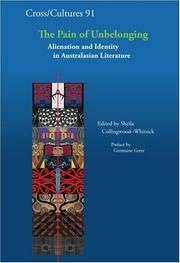| Listing 1 - 3 of 3 |
Sort by
|

ISBN: 9401204276 1429480831 9781429480833 904202187X 9789042021877 9789401204279 904202187X 9789042021877 Year: 2007 Publisher: Amsterdam New York, NY Rodopi
Abstract | Keywords | Export | Availability | Bookmark
 Loading...
Loading...Choose an application
- Reference Manager
- EndNote
- RefWorks (Direct export to RefWorks)
Beyond the obvious and enduring socio-economic ravages it unleashed on indigenous cultures, white settler colonization in Australasia also inflicted profound damage on the collective psyche of both of the communities that inhabited the contested space of the colonial world. The acute sense of alienation that colonization initially provoked in the colonized and colonizing populations of Australia and New Zealand has, recent studies indicate, developed into an endemic, existential pathology. Evidence of the psychological fallout from the trauma of geographical deracination, cultural disorientation and ontological destabilization can be found not only in the state of anomie and self-destructive patterns of behaviour that now characterize the lives of indigenous Australian and Maori peoples, but also in the perpetually faltering identity-discourse and cultural rootlessness of the present descendants of the countries’ Anglo-Celtic settlers. It is with the literary expression of this persistent condition of alienation that the essays gathered in the present volume are concerned. Covering a heterogeneous selection of contemporary Australasian literature, what these critical studies convincingly demonstrate is that, more than two hundred years after the process of colonisation was set in motion, the experience that Germaine Greer has dubbed 'the pain of unbelonging' continues unabated, constituting a dominant thematic concern in the writing produced today by Australian and New Zealand authors.
Australasian literature --- Alienation (Social psychology) in literature. --- Alienation (Philosophy) in literature. --- Identity (Psychology) in literature. --- Identity (Philosophical concept) in literature. --- Australasian literature. --- Identity in literature --- History and criticism. --- Australian literature --- New Zealand literature

ISBN: 9789042021877 Year: 2007 Volume: 91 Publisher: Amsterdam [etc.] Rodopi
Abstract | Keywords | Export | Availability | Bookmark
 Loading...
Loading...Choose an application
- Reference Manager
- EndNote
- RefWorks (Direct export to RefWorks)
Beyond the obvious and enduring socio-economic ravages it unleashed on indigenous cultures, white settler colonization in Australasia also inflicted profound damage on the collective psyche of both of the communities that inhabited the contested space of the colonial world. The acute sense of alienation that colonization initially provoked in the colonized and colonizing populations of Australia and New Zealand has, recent studies indicate, developed into an endemic, existential pathology. Evidence of the psychological fallout from the trauma of geographical deracination, cultural disorientation and ontological destabilization can be found not only in the state of anomie and self-destructive patterns of behaviour that now characterize the lives of indigenous Australian and Maori peoples, but also in the perpetually faltering identity-discourse and cultural rootlessness of the present descendants of the countries’ Anglo-Celtic settlers. It is with the literary expression of this persistent condition of alienation that the essays gathered in the present volume are concerned. Covering a heterogeneous selection of contemporary Australasian literature, what these critical studies convincingly demonstrate is that, more than two hundred years after the process of colonisation was set in motion, the experience that Germaine Greer has dubbed 'the pain of unbelonging' continues unabated, constituting a dominant thematic concern in the writing produced today by Australian and New Zealand authors.
Book

ISBN: 2367813949 2842698851 Year: 2021 Publisher: Montpellier : Presses universitaires de la Méditerranée,
Abstract | Keywords | Export | Availability | Bookmark
 Loading...
Loading...Choose an application
- Reference Manager
- EndNote
- RefWorks (Direct export to RefWorks)
As liminal beings, ghosts seem particularly appropriate to define, question or challenge hybrid cultures where several, seemingly irreconcilable, identities coexist. The present volume wonders how they manifest themselves in the English-speaking world, and whether there is a specifically postcolonial kind of haunting. The twenty-two articles deal with textual, translational or historical ghosts, and take us to Canada, Australia, Africa, India or the Caribbean. Poems by Gerry Turcotte literally haunt the volume, which thus juxtaposes theory and practice in a dynamic and fruitful way. De par leur liminalité, les fantômes semblent particulièrement adaptés pour définir, interroger ou remettre en question des cultures hybrides où coexistent plusieurs identités apparemment inconciliables. Ce volume explore leurs diverses manifestations dans le monde anglophone, se demandant s’il existe une hantise proprement postcoloniale. Les vingt-deux articles nous présentent des fantômes historiques ou textuels, et nous emmènent du Canada à l’Australie, de l’Afrique à l’Inde ou à la Caraïbe. Des poèmes de Gerry Turcotte hantent littéralement le volume, qui juxtapose ainsi théorie et pratique de façon dynamique et féconde.
Literature (General) --- traduction --- politique --- mythologie --- intertextualité --- spectralité --- littérature postcoloniale --- fantôme --- commonwealth --- translation --- politics --- mythology --- intertextuality --- spectrality --- postcolonial literature --- ghost --- ghostwriting
| Listing 1 - 3 of 3 |
Sort by
|

 Search
Search Feedback
Feedback About UniCat
About UniCat  Help
Help News
News